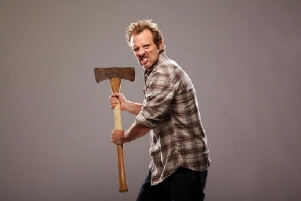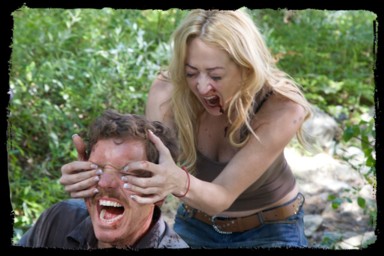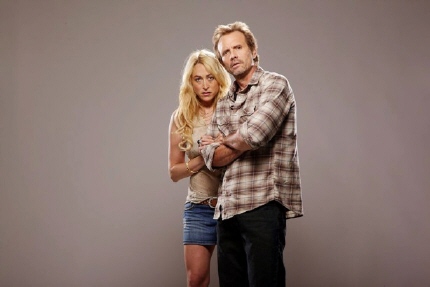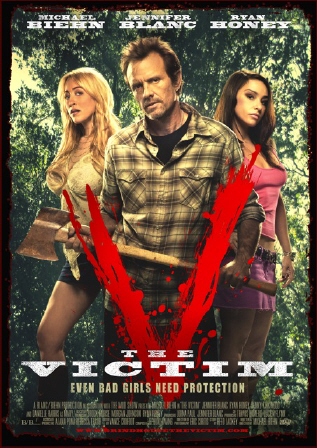When I told Michael Beihn, an actor who has starred in everything from The Terminator to Tombstone, that his writing and directing debut, The Victim, was unrepentantly sleazy, he took it as a compliment.
At a screening for KC FilmFest on April 9, Biehn jokingly warned viewers who objected to sex and violence that they might not want to sit through the illicit delights to  come. It was quickly obvious that Biehn's thriller was not mere hackery. The rookie filmmaker gushed about what he and his crew had accomplished with a mere 12 days of shooting.
come. It was quickly obvious that Biehn's thriller was not mere hackery. The rookie filmmaker gushed about what he and his crew had accomplished with a mere 12 days of shooting.
His enthusiasm was so evident that his opening remarks partially delayed the start of the movie. Fortunately, his producer, co-star and wife Jennifer Blanc, who has been featured in Dark Angel and Party of Five, was there to keep things on schedule, "Michael, there's a Q&A after the movie."
Los Angeles viewers eager to catch what the Cowtown crowd saw can check out the May 3 screening at the New Beverly Cinema. There are standby tickets for the 7:30 p.m. screening. It will also play June 4 at 5:20 p.m. during the Another Hole in the Head Genre Film Festival at the Roxie Theater in San Francisco.
Based on a treatment by Reed Lackey, The Victim is about a middle-aged hermit (Biehn), who shelters an exotic dancer (Blanc) after she witnesses a coworker (Danielle Harris) being murdered by a crooked, cocaine addicted sheriff's deputy (Ryan Honey), as his partner (Denny Kirkwood) simply watches. Naturally, when sex, drugs and violence get involved, a volatile conclusion is guaranteed.
The film works because Biehn doesn't let spurious moralizing get in the way of the shameful fun. He also wisely keeps his directorial tongue firmly in cheek. The film's opening disclaimer is a riot. If a line of dialogue gets stilted or if a character utters a remark that sounds a little too sordid to be believable, don't worry; it's completely intentional. 
Contacted by phone in Los Angeles five days later, Biehn and Blanc both happily recounted how their tribute to 1970s grindhouse thrillers went over in the Bible Belt. "I was kind of worried. I tried to prompt the audience to let them know it was OK to have fun. It was OK to laugh. It's just an exploitation movie, nothing more, nothing less. And the performances are crafted to the point where they're almost over the top." says Biehn.
I can hear Blanc giggling on other end of the line when he says, "If you don't like sex, and you don't like a little torture and so on and so forth, then don't come see it."
She adds, "We were really thrilled they got it. 'Will Middle America get it?' And they got it right away."
For the uninitiated, grindhouses (as in bump and grind) were often repurposed burlesque theaters that specialized in showing luridly entertaining flicks. The movies were often a bawdy alternative to more sanitized Hollywood fare.
"It's not going to be a movie that you try to dissect like Black Swan," he says. "It's like eating a bowl of ice cream. You'll enjoy it while you're eating it. You'll feel a little bad afterwards, but it was fun while you're eating it." "That's how I usually feel about ice cream," Blanc adds.
Biehn played an unfortunate sheriff in Robert Rodriguez and Quentin Tarantino's 2007 tribute film Grindhouse and decided that the only thing that could be more fun that starring in or watching a film like The Streetfighter (a Sonny Chiba martial arts classic) or Ilsa, She Wolf of the SS would be making one.
"Whenever I would bring up a reason why I couldn't direct, Robert (Rodriguez) would say 'What are you talking about?' I said, 'Robert, I don't feel completely comfortable with the camera or the lenses.' He has this aura about him. He just doesn't hear that. He said, 'Michael, just go write something and shoot it. He's a very inspiring guy," recalls Biehn, who also consulted with Rodriguez's book, Rebel without a Crew.
In fact, Biehn says that he's a recent convert to the genre. Growing up in Lincoln, Neb., the films he caught while his parents were watching more serious fare at the drive-in were more likely to star Vic Morrow or Angie Dickinson than Chiba.
"What I saw a lot of were just B-movies," says Biehn. "The reason I called ours a grindhouse movie was because it was low budget and exploitation. I really didn't have enough money to do a real grindhouse movie because if you're doing a zombie movie, you need a bunch of zombies. You need costumes, you need special effects makeup. The same with vampires.
"I just didn't have that kind of money. I said, 'What is there that I can exploit? What combination of things can I use that aren't going to be expensive? And I came up with hot women -- hot chicks as I would say, sex, drugs and dirty cops and a little bit of action I could afford, a little torture and a serial killer, which is always kind of good in that genre. I just put 'em all together in that script."
According to Biehn, that script wasn't available during pre-production, when he, Blanc and the rest of the crew scouted locations. "The whole movie was in my head," he says. "Everybody just had to follow me around. All during the day, we would go to locations, and I'd try to explain what I wanted. Everybody was pulling their hair out. Basically, we did pre-production, and at night I would write the script."
In addition to having to take direction from himself and to be responsible for the lines he and every other actor would have to recite, Biehn says that time was another obstacle. He says, "I've been around 35 years, and I've never shot in less than 24 days." Blanc adds, "Or for less than a million dollars." He adds that his wife won't let him reveal the precise budget. Whereas some couples attempt to hide their differences, Biehn and Blanc frequently joke about theirs." "There's a song in the movie called 'Screaming Beauty.' He likes to call me that," says Blanc.
Biehn adds, "You've got to remember that The Terminator (where he played the heroic Kyle Reese) was shot 25 years ago for a budget of $6.5 million, when the dollar went a lot farther. And (James Cameron) had 11 weeks to shoot that movie. Granted, there was a lot of stuff that had to do with Arnold (Schwarzenegger) that took up that time. I've been in a lot of cheesy little movies they paid me a lot of money for, but they've always been 24-day shoots."

Blanc and Biehn before the film played in Kansas City.
© 2011 BlancBiehn Productions, used by permission.
When asked if he followed exploitation king Roger Corman's rules about when shocks should appear in the film, Biehn said, "I didn't have anything like, 'We have to see a tit every 30 minutes.'"
That said, grindhouse movies have occasionally explored serious themes conventional films ignored. For example, Joe Dante's Piranha offered a scathing critique of Vietnam-era covert ops, and Rodriguez's Machete poked fun at immigration issues.
When asked if he had a similar point to make, Biehn thought for a second and said, "When you look at Elliot Spitzer, Bill Clinton and the wide stance guy from Minnesota (former Senator Larry Craig, and the former preacher who was having gay massages (Ted Haggard), there's the power of women's sexuality to turn us into complete and fucking idiots is what this whole kind of thing is about. I understand Elliot Spitzer. I understand Bill Clinton, and I don't judge them."
While Biehn is proud to push audience buttons, he still had some personal limits set in The Victim. "I don't like gratuitous violence. I don't like the Saw movies. I don't like the Hostel movies. I don't like anything that is violence for violence's sake. I know it's a genre, but some things become almost pornographic with the violence. I know I have that one (violent) shot (in The Victim). I didn't even want to show much of that. It was always going to be me with the camera just over my shoulder, seeing me hitting him, and you imagining what's happening." He laughs, "I think we pushed the sexuality as far as we could. My moral compass swings far to the left, but when it comes to gratuitous violence, I have trouble."
Despite what he's accomplished in the director's chair, Biehn is probably proudest of having played outlaw Johnny Ringo in Tombstone. Last week, the film's screenwriter Kevin Jarre, who also wrote Glory, died at age 56. "I immediately wanted to play Doc Holliday. That ended up going to Val (Kilmer). The next character I wanted to play was Johnny Ringo. It was an extremely well-written script. It was 135 pages. The role was extremely well-written, and you could just tell that.
"There was just a way that Kevin wrote which is like 'I'm your huckleberry' that Val says. There's almost like a different speech they had back then, and that ran throughout the entire script. That's why you got people like Sam Elliott, Michael Rooker, Billy Bob Thornton, John Corbett, Powers Boothe, Thomas Haden Church. Everybody wanted to be a part of it. You put together that cast, and there's a hell of a lot of great actors in there."

© 2011 BlancBiehn Productions, used by permission.
Because my brother has been a professor at the University of Arizona, I was curious to know about Biehn's time there. "I was at the University of Arizona from 1974 to 1974, on a drama scholarship," he says. "To be perfectly honest with you, I was partying a lot in school. I didn't have any good study habits from high school because I just kind of got by on being a jock.
"Halfway through my second semester, I realized I was going to flunk out. I come from a family of doctors and lawyers. I was going to have to come back with my tail between my legs. I did a preemptive strike and said, 'This isn't working for me. I want to go to Los Angeles and become an actor.'"
He adds, "I hear a lot of people are still getting the same education."
All images, © 2011 BlancBiehn Productions, used by permission.
